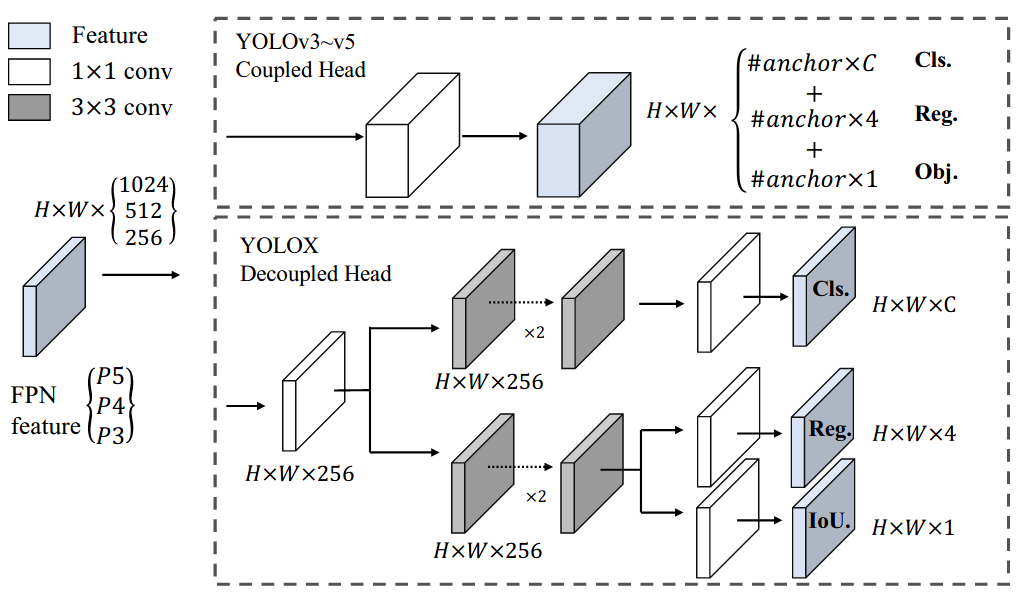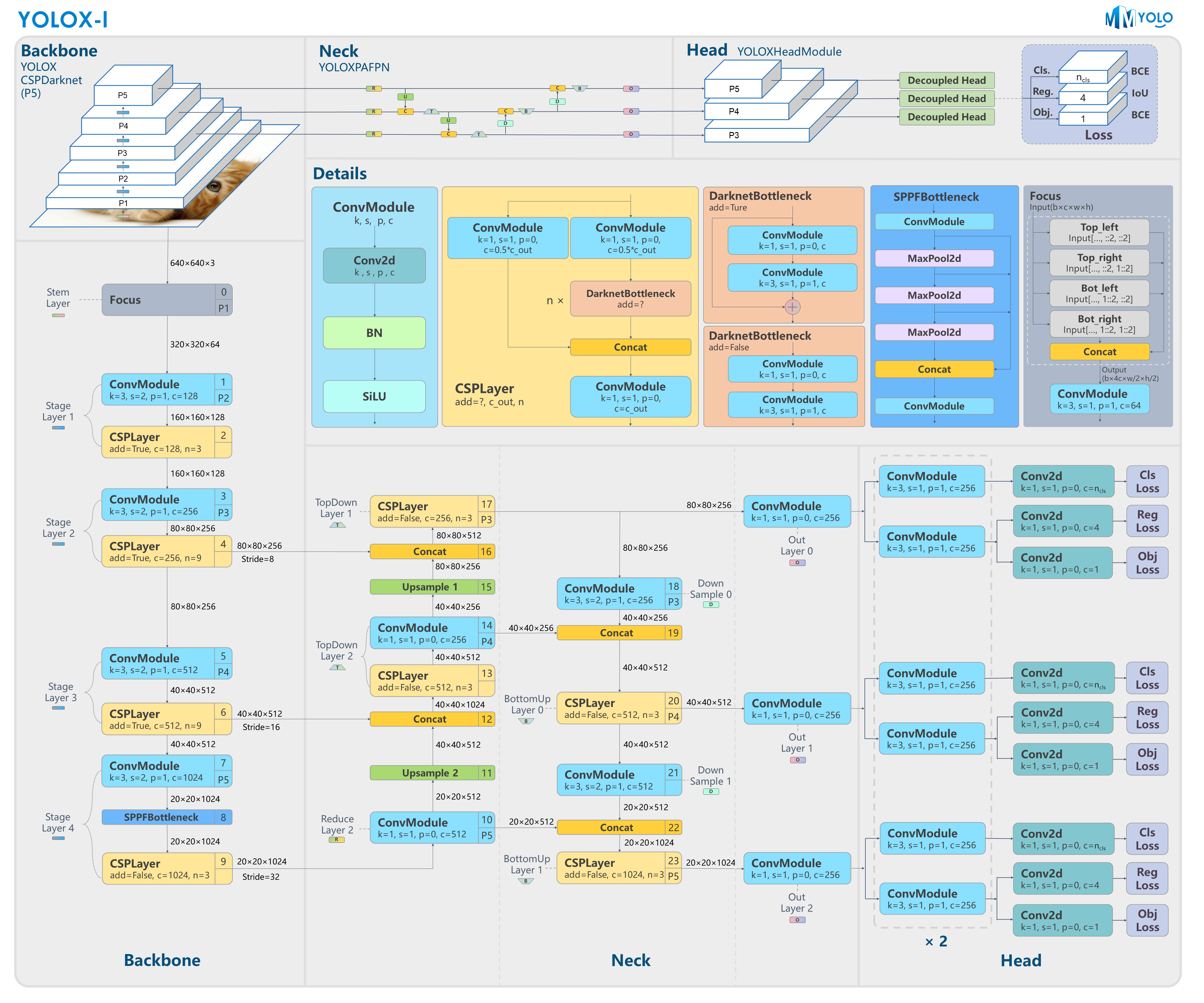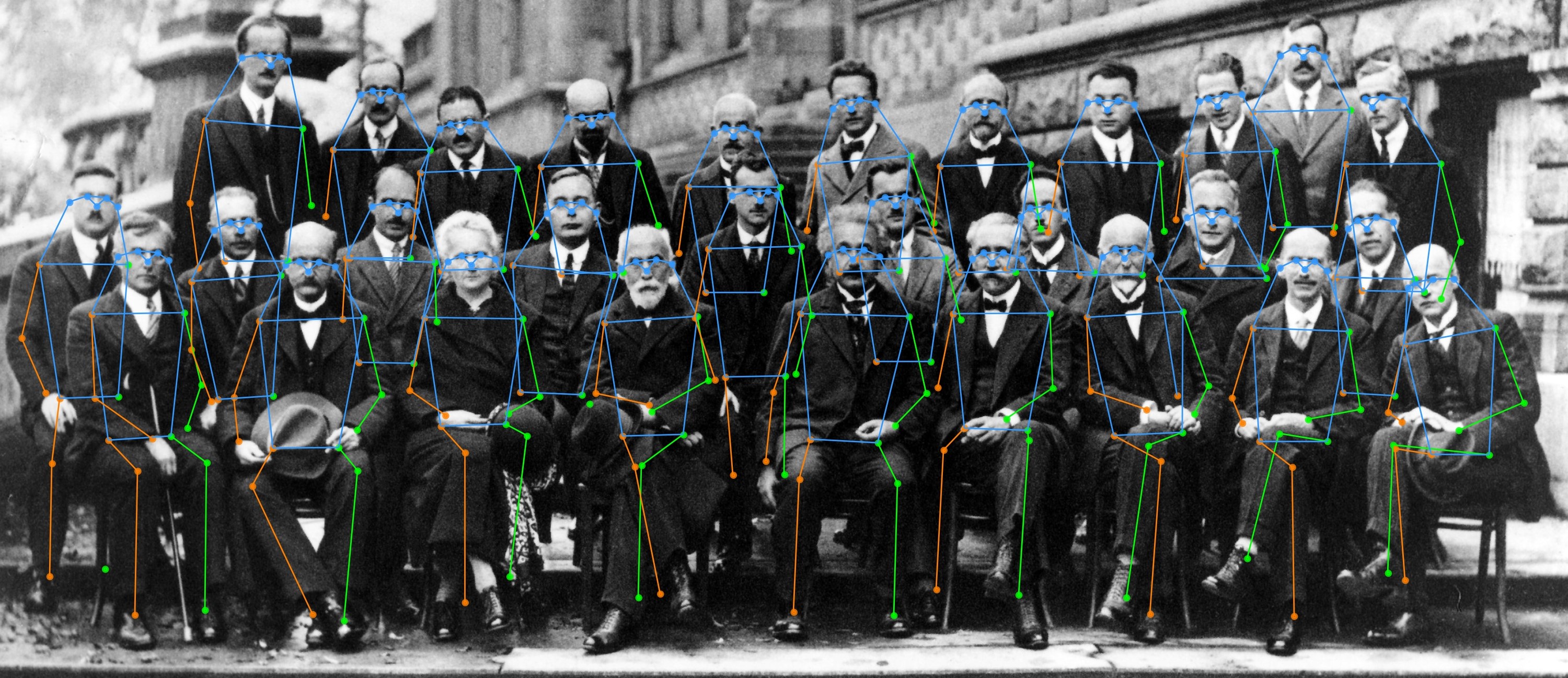Spaces:
Running
on
T4
YOLOX
Abstract
In this report, we present some experienced improvements to YOLO series, forming a new high-performance detector -- YOLOX. We switch the YOLO detector to an anchor-free manner and conduct other advanced detection techniques, i.e., a decoupled head and the leading label assignment strategy SimOTA to achieve state-of-the-art results across a large scale range of models: For YOLO-Nano with only 0.91M parameters and 1.08G FLOPs, we get 25.3% AP on COCO, surpassing NanoDet by 1.8% AP; for YOLOv3, one of the most widely used detectors in industry, we boost it to 47.3% AP on COCO, outperforming the current best practice by 3.0% AP; for YOLOX-L with roughly the same amount of parameters as YOLOv4-CSP, YOLOv5-L, we achieve 50.0% AP on COCO at a speed of 68.9 FPS on Tesla V100, exceeding YOLOv5-L by 1.8% AP. Further, we won the 1st Place on Streaming Perception Challenge (Workshop on Autonomous Driving at CVPR 2021) using a single YOLOX-L model. We hope this report can provide useful experience for developers and researchers in practical scenes, and we also provide deploy versions with ONNX, TensorRT, NCNN, and Openvino supported.

 YOLOX-l model structure
YOLOX-l model structure
🥳 🚀 Results and Models
| Backbone | Size | Batch Size | AMP | RTMDet-Hyp | Mem (GB) | Box AP | Config | Download |
|---|---|---|---|---|---|---|---|---|
| YOLOX-tiny | 416 | 8xb8 | No | No | 2.8 | 32.7 | config | model | log |
| YOLOX-tiny | 416 | 8xb32 | Yes | Yes | 4.9 | 34.3 (+1.6) | config | model | log |
| YOLOX-s | 640 | 8xb8 | Yes | No | 2.9 | 40.7 | config | model | log |
| YOLOX-s | 640 | 8xb32 | Yes | Yes | 9.8 | 41.9 (+1.2) | config | model | log |
| YOLOX-m | 640 | 8xb8 | Yes | No | 4.9 | 46.9 | config | model | log |
| YOLOX-m | 640 | 8xb32 | Yes | Yes | 17.6 | 47.5 (+0.6) | config | model | log |
| YOLOX-l | 640 | 8xb8 | Yes | No | 8.0 | 50.1 | config | model | log |
| YOLOX-x | 640 | 8xb8 | Yes | No | 9.8 | 51.4 | config | model | log |
YOLOX uses a default training configuration of 8xbs8 which results in a long training time, we expect it to use 8xbs32 to speed up the training and not cause a decrease in mAP. We modified train_batch_size_per_gpu from 8 to 32, batch_augments_interval from 10 to 1 and base_lr from 0.01 to 0.04 under YOLOX-s default configuration based on the linear scaling rule, which resulted in mAP degradation. Finally, I found that using RTMDet's training hyperparameter can improve performance in YOLOX Tiny/S/M, which also validates the superiority of RTMDet's training hyperparameter.
The modified training parameters are as follows:
- train_batch_size_per_gpu: 8 -> 32
- batch_augments_interval: 10 -> 1
- num_last_epochs: 15 -> 20
- optim cfg: SGD -> AdamW, base_lr 0.01 -> 0.004, weight_decay 0.0005 -> 0.05
- ema momentum: 0.0001 -> 0.0002
Note:
- The test score threshold is 0.001.
- Due to the need for pre-training weights, we cannot reproduce the performance of the
yolox-nanomodel. Please refer to https://github.com/Megvii-BaseDetection/YOLOX/issues/674 for more information.
YOLOX-Pose
Based on MMPose, we have implemented a YOLOX-based human pose estimator, utilizing the approach outlined in YOLO-Pose: Enhancing YOLO for Multi Person Pose Estimation Using Object Keypoint Similarity Loss (CVPRW 2022). This pose estimator is lightweight and quick, making it well-suited for crowded scenes.

Results
| Backbone | Size | Batch Size | AMP | RTMDet-Hyp | Mem (GB) | AP | Config | Download |
|---|---|---|---|---|---|---|---|---|
| YOLOX-tiny | 416 | 8xb32 | Yes | Yes | 5.3 | 52.8 | config | model | log |
| YOLOX-s | 640 | 8xb32 | Yes | Yes | 10.7 | 63.7 | config | model | log |
| YOLOX-m | 640 | 8xb32 | Yes | Yes | 19.2 | 69.3 | config | model | log |
| YOLOX-l | 640 | 8xb32 | Yes | Yes | 30.3 | 71.1 | config | model | log |
Note
- The performance is unstable and may fluctuate and the highest performance weight in
COCOtraining may not be the last epoch. The performance shown above is the best model.
Installation
Install MMPose
mim install -r requirements/mmpose.txt
Citation
@article{yolox2021,
title={{YOLOX}: Exceeding YOLO Series in 2021},
author={Ge, Zheng and Liu, Songtao and Wang, Feng and Li, Zeming and Sun, Jian},
journal={arXiv preprint arXiv:2107.08430},
year={2021}
}